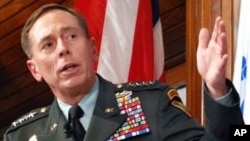The U.S. and NATO commander in Afghanistan, General David Petraeus, has issued his first tactical directive to the nearly 150,000 troops under his command, designed in part to address concerns expressed by some troops that previous orders made it too difficult for them to defend themselves.
General Petraeus' directive orders his troops not to use force unless they are sure no Afghan civilians will be harmed, except in two circumstances. The exact wording of that part of the directive has been kept secret. But a release from the NATO command says the only situations in which Afghan civilians can be put at risk are those "where it is determined no other options are available" to protect international or Afghan troops
Aside from such instances, the troops are required to make the protection of Afghan civilians their top priority.
Some troops had complained that the previous directive, issued a year ago by General Petraeus' predecessor, excessively restricted their ability to defend themselves. The NATO military spokesman in Kabul, German Brigadier General Josef Blotz, says the document makes clear that is not the case.
"General Petraeus has made it quite clear that nothing is intended to hinder an individual's right to self defense," said General Blotz.
General Petraeus is a leader of the counterinsurgency movement in the U.S. military, which emphasizes protecting the local population. But he told his Senate confirmation hearing in June he also recognizes it is important for the troops to be able to protect themselves.
"I see it as a moral imperative to bring all assets to bear to protect our men and women in uniform and the Afghan security forces with whom ISAF [International Security Assistance Force] troopers are fighting shoulder-to-shoulder," said General Petraeus. "Those on the ground must have all the support they need when they are in a tough situation."
Some military officials concluded that local commanders had interpreted the previous directive too tightly, so General Petraeus says in his order that "subordinate commanders are not authorized to further restrict this guidance" without his approval.
Retired U.S. Army Lieutenant General James Dubik says that is important.
"Between the lines, he is seeking to achieve more alignment up and down the chain of command so that there's more clarity than perhaps in the recent months," said James Dubik. "You don't want a restriction at his level then to be more restricted at the next level below him, and then restricted even more the next level down, and by the time you get to the poor platoon and squad level, they can't shoot at anything. So wisely he said, 'look, these are the restrictions that all of us will live by.'"
The Petraeus document also tells the troops to be "relentless" in pursuing the Taliban and related groups, but says "we must balance our pursuit of the enemy with our efforts to minimize loss of innocent civilian life, and with our obligation to protect our troops." Petraeus says it is a "moral imperative" both to protect the civilians and to protect the troops.
General Dubik says those sometimes conflicting goals put a lot of pressure on ordinary soldiers and young officers in small units, which often operate in difficult conditions far from headquarters.
"We ask and demand decisions by sergeants, lieutenants and captains in Afghanistan, and in Iraq, every day that are very complex, that require refined judgment and a balancing of competing priorities," he said. "This is something that I think is completely appropriate to push down."
In the directive, General Petraeus says he expects the troops "to exert their best judgment according to the situation on the ground," and pledges to support them when they do.
Petraeus also says all operations must involve Afghan forces, in part to increase the international troops' understanding of the local situation. He also tells the troops the new approach President Barack Obama announced in December is already showing results and starting to build momentum by beginning to reduce public support for the insurgency. He describes the war as "a contest of wills," and tells the troops "every Afghan civilian death diminishes our cause."











